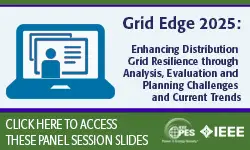A Probabilistic Reverse Power Flows Scenario Analysis Framework
Antonin Demazy, Tansu Alpcan, and Iven Mareels
-
Members: FreePES
IEEE Members: Free
Non-members: FreePages/Slides: 9
22 Oct 2020
Distributed Energy Resources (DER), mainly residential solar PV, are embedded deep within the power distribution network and their adoption is fast increasing globally. As more customers participate, these power generation units cause Reverse Power Flow (RPF) at the edge of the grid, directed upstream into the network, thus violating one of the traditional design principles for power networks. The effects of a single residential solar PV system is negligible, but as the adoption by end-consumers increases to high percentages, the aggregated effect is no longer negligible and must be considered in the design and configuration of power networks. This article proposes a framework that helps to predict the RPF intensity probability for any given scenario of DER penetration within the distribution network. The considered scenario parameters are the number and location of each residential DERs, their capacity and the daily net-load profiles. Classical simulation-based approach for this is not scalable as it relies on solving the load-flow equations for each individual scenario. The framework leverages machine learning techniques to make fast and precise RPF prediction within the network for each scenario. The framework enables the Distribution Network Service Providers (DNSPs) to assess DERs penetration scenarios at a granular level, derive and localise the RPF risks and assess the respective impacts on the installed assets for network planning purpose. The framework is illustrated with scenario analysis conducted on an IEEE 123 bus system and OpenDSS and shown that it can lead to multiple orders of magnitude savings in computational time while retaining an accuracy of 94% or above compared to classical brute force simulations.


